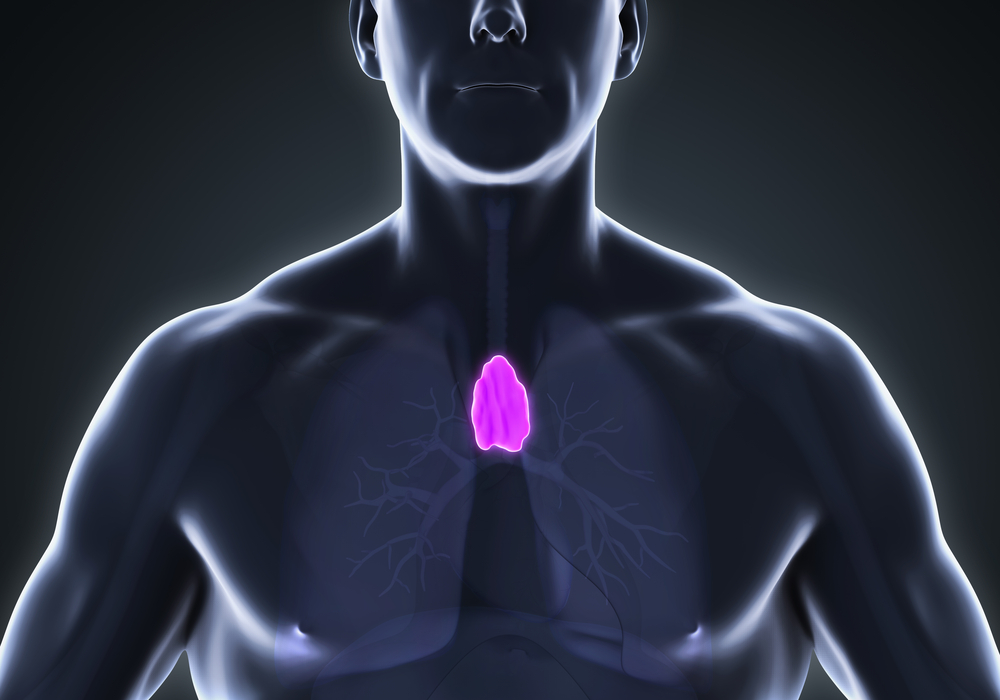Longevity: Thymus Health and Regeneration
The thymus is an amazing little gland in the body that does some very important things. It’s part of the lymphatic system along with adenoids, spleen and tonsils and is also part of the endocrine system. It is located in the center of the chest behind the sternum and is responsible for producing progenitor cells which mature into T-cells (thymus-derived cells). The thymus also produces immune regulating compounds, hormones such as thymosin, thymopoietin and thymulin, as well as other peptides and interleukins. It is one organ that reaches maturity in utero and involutes as we age. The involution of the thymus changes it’s architecture, causing it to lose its organized structure and is replaced with adipose tissues as it becomes functionally less active(1). As we age, our thymus regresses and increases our susceptibility to disease and further aging due to the decline in T-cell output(1)(2). Advance aging correlates with a reduced ability of the immune system to generate antigen specific responses to pathogens. This profound change exhibited by the aging immune system is termed immunosenescence, affecting both innate and adaptive immunity(2). We can help slow down this regression or even regenerate the thymus gland through a number of interventions. By doing this we can reestablish a stronger and healthier immune system, helping ward off aging and age-related diseases.
A number of vitamins and minerals can help the health and functionality of the thymus as we age. High vitamin C intake has shown to suppress age-related thymic atrophy whilst promoting maturation of T-cells(3)(4). Vitamin A deficiency has shown to effect the production of thymosin-β4 and CD4 but high vitamin E intake enhances T-cell differentiation via TEC functions in the thymus(5)(6). Exogeneous melatonin leads to a marked reduction in signs of thymic aging, while being zinc deficient causes age related immunological dysfunction, including thymic failure(9)(10). However, when it comes to increasing thymus health and regeneration, one of the best tools for this job are bioregulatory peptides such as Thymalin.
Thymalin is a synthetic version of thymulin (H-Pyr-Ala-Lys-Ser-Gln-Gly-Gly-Ser-Asn-OH). It was first isolated from the thymus gland in 1977 and has been studied for its geroprotective effects, meaning it aims to affect the root cause of aging and age-related diseases. It regulates immune function via increased T-cell activity, lowering inflammation, raising immunoglobulin A and has shown to be neuroprotective. One study researched the effects Thymalin has on the elderly (60yrs+) over a 6-8 year period, receiving the peptide for the first 2-3 years of observation(7). The results showed the ability for bioregulators to normalize functions in cardiovascular, endocrine, immune and nervous systems. This restoration of homeostasis was accompanied by a 2.0-2.4-fold decrease acute respiratory disease, ischemic heart disease, hypertension disease, osteoarthrosis and osteoporosis(7). There was a significant improvement in the overall health state of the peptide treated patients which correlated with a decreased mortality rate during observations by 2.0-2.1 fold, demonstrating prevention in age related pathology and prolonging active longevity(7).
Other studies show it has pronounced antitumor effects, causing tumor growth arrest and also regression, some seeing growth suppression by 78%(8). Thymalin induced a significant increase in lymphoproliferative activity and the content of tissue basophils and plasmocytes in the thymus lobules(8). The results of other studies shows that thymalin significantly enhances immunological resistance to viral infections(11). Research demonstrates thymalin’s ability to regenerate the thymus gland, helping increase immunity whilst warding off age-related diseases.
A healthy lifestyle is the best way to attain a long and healthy life. If we want to help slow the onset of aging and age-related diseases, we need to incorporate lifestyle and nutritional factors into our life, supporting the body’s organs and systems as we get older. A healthy thymus is vital to longevity and if we support it throughout life with the right nutrients and even peptide technology, we can greatly affect and combat this major factor of aging. Living younger and longer without the diseases that primarily come with advanced age.
Written by Luke Pavasovic
Director and Naturopath at Alchemic Health
facebook.com/alchemichealth
www.alchemichealth.com
References:
1. https://www.ncbi.nlm.nih.gov/books/NBK539748/
2. https://www.ncbi.nlm.nih.gov/pmc/articles/PMC3791471/
3. https://pubmed.ncbi.nlm.nih.gov/25608928/
4. https://www.ncbi.nlm.nih.gov/pmc/articles/PMC3869442/
5. https://www.ncbi.nlm.nih.gov/pmc/articles/PMC6296595/
6. https://pubmed.ncbi.nlm.nih.gov/9523031/
7. https://pubmed.ncbi.nlm.nih.gov/14523363/
8. https://www.pubfacts.com/detail/29797130/Effect-of-Thymalin-on-the-Tumor-and-Thymus-under-Conditions-of-Activation-Therapy-In-Vivo
9. https://www.ncbi.nlm.nih.gov/pmc/articles/PMC5995606/
10. https://pubmed.ncbi.nlm.nih.gov/8582782/
11. https://pubmed.ncbi.nlm.nih.gov/8067076/



